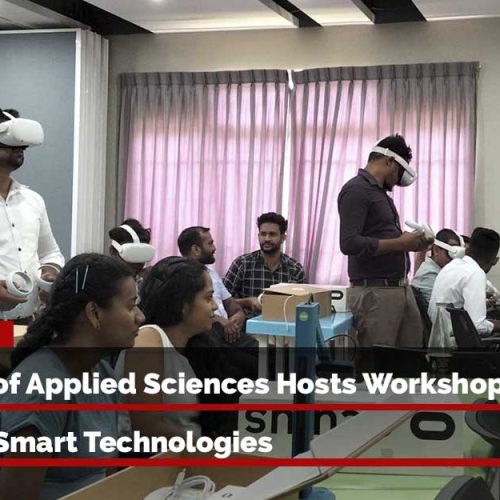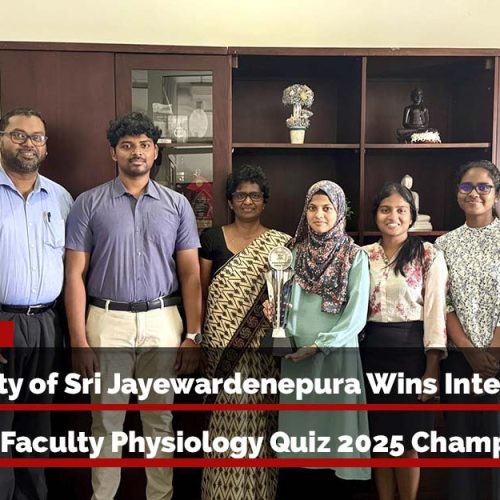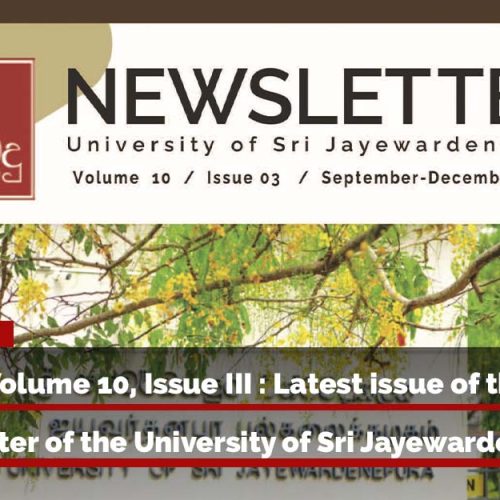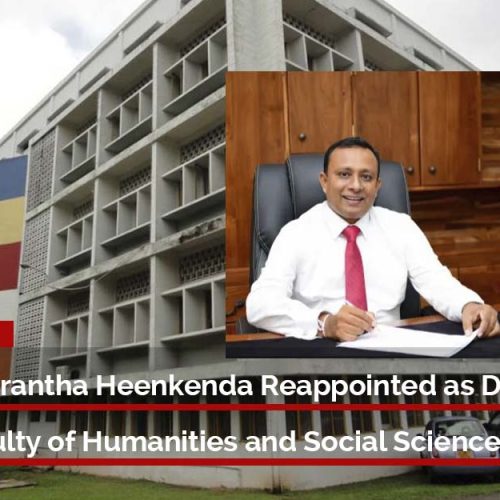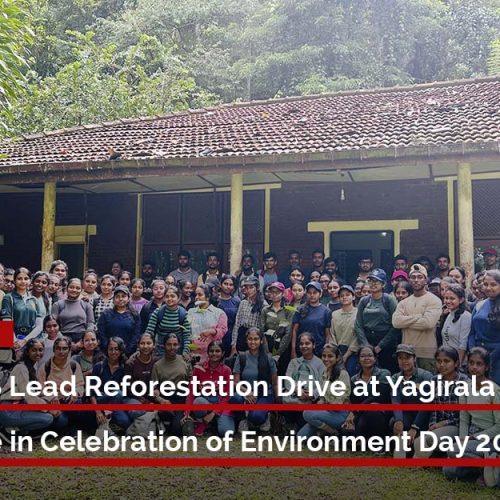
As a leading higher education institute and a pioneer in environmental education in Sri Lanka, the University of Sri Jayewardenepura has recognized the importance of being accountable for the environmental impacts of its daily operations. Materializing a concept of Dr Priyan Perera, the Center for Sustainability of the Department of Forestry and Environmental Science, University of Sri Jayewardenepura in collaboration with the Forest Department and the Ministry of Mahaweli Development and Environment has launched a novel project to make the University of Sri Jayewardenepura the first “Carbon neutral” university in Sri Lanka. Under this project, it is expected to restore a 400 ha forest in Karuwalagaswewa, which will contribute to the national er thiforest cover while serving as the carbon sink of the University. MoU was signed between the USJP and the Forest Department on 9th October 2019. This carbon in-setting strategy will be a model project of national significance for other higher education institutes to follow.
Global warming is taking a toll on the earth and its inhabitants. We have already reached 1.1oC of global warming and we could reach 1.5oC by 2030. As a result of human activities, greenhouse gas (GHG) emissions have increased. GHG is a gas that absorbs and emits the sun’s thermal radiation. The primary GHGs in the earth’s atmosphere are water vapor, carbon dioxide, methane, nitrous oxide, and ozone. They cause the greenhouse effect, acting as a blanket that keeps the earth and its inhabitants warm.
Excessive GHG emissions occur during human activities, causing an increase of GHG gases in the atmosphere, such as during fossil fuel burning from vehicles, coal power plants, These gases last for years in the atmosphere, trapping the heat and causing the planet to get hotter, causing global warming. Meanwhile, humans continue to destroy and exploit forests and other natural ecosystems, polluting their environment. All these are fuelling the change in the average climate and weather patterns of the world, causing global climate change.
Intensified heat waves are taking lives of hundreds of humans and sensitive plants and animal species, underwater heatwaves threaten the survival of deepwater dwelling species, more frequent wildfires such as the most recent incidents in Amazon and Ella have taken a toll on the earth’s rich biodiversity while emitting large volumes of CO2. Flash floods and landslides have displaced thousands around the world, droughts and altered rainfall patterns are reducing global crop yields, frozen glaciers are in the process of melting, and causing sea levels to rise, countries such as the Maldives are at risk of submerging.
Global climate change is happening faster than we thought; hence we are in a state of “global climate emergency” according to the United Nations Climate Action Summit. UN Secretary-General Antonio Guterres has invited world leaders to cut their nations’ GHG emissions by 45% over the next decade.
The impacts of global warming are being felt across the world. As an island, Sri Lanka needs to be concerned about the repercussions of global warming and climate change. In recent years, we’ve been hearing more and more about the idea of carbon footprint, which is a measure of the total amount of GHGs released into the atmosphere as a result of the activities of a particular individual, organization, or community. Many organizations and communities have calculated their carbon footprint, in order to take action against the reduction of GHGs.
For the first time in a state university of Sri Lanka, the University of Sri Jayewardenepura has calculated its carbon footprint, recognizing the urgent need for climate action and remediation. The Center for Sustainability of the Department of Forestry and Environmental Science, Faculty of Applied Sciences of the University of Sri Jayewardenepura has taken the initiative for the carbon footprint calculation.
The Center for Sustainability (CFS) is a body for environmental extension, research and community outreach, linked to the Department of Forestry and Environmental Science (DFES), University of Sri Jayewardenepura., committed to produce a new breed of responsible stewards of environment through promoting the concept of sustainability among corporate sector, general public, university academia and students, primarily through professional support, education and awareness. The CFS team is comprised of highly skilled professionals within the University of Sri Jayewardenepura, providing services such as Environmental Impact Assessments, Initial Environmental Examinations, Biodiversity Assessments, Ecological and Landuse Surveys, Carbon footprint verification and Cooperate Sustainability Solutions. Together with the Department of Forestry and Environmental Science, CFS has been managing a 100-acre block of the Yagirala Rainforest Reserve since 1984, predominantly for research and education purposes. CFS caters numerous services at Yagirala Research Center with a natural blend experience.
The CFS has taken the forefront in carbon neutrality research in the university by considering the international standard of ISO 14064. Direct & indirect emission sources of the university were accounted for with respect to the three scopes namely scope 1, 2 and 3. Direct emissions such as fuel consumption for university-owned vehicles, on-site fuel consumption for generators, gas burners, especially used in laboratory purposes as well as indirect emissions such as purchased electricity for lecture halls, administrative buildings, laboratories, canteens, and hostels were also considered for this calculation.
Throughout the years the University of Sri Jayewardenepura has managed to develop in many areas expanding its horizons, excelling in academics & research. In the path of reaching the peak of academic heights, the university has also become responsible for a significant amount of inevitable greenhouse gas emissions with its total population over 14,000 and is the largest university in terms of the student population.
Putting the research findings into practice, CFS has developed a comprehensive plan to compensate for the university’s GHG emissions. Spearheaded by Dr. Priyan Perera, the Director, Center for Sustainability, a major strategy has been adopted for carbon offsetting through the carbon in the setting. In this mechanism, reforestation has taken as a major implementation to offset the 7000 tons of Carbon dioxide which emits from the operations of the University of Sri Jayewardenepura. Further, reforestation is proven to be one of the best solutions for global climate change. Planting trees is a great way to invest in longer-term carbon sequestration because the advantages of forest restoration extend beyond acting as a carbon sink.
In collaboration with the Forest Department and the Ministry of Mahaweli Development and Environment, a carbon sink will be created by the restoration of 400 ha of degraded dry mixed evergreen forest owned by the Forest Department in Karuwalagaswewa, Puttlam. In a time frame where deforestation and loss of biodiversity have become a major issue in Sri Lanka, there is an urgent need to combat deforestation and habitat loss, for the sustainable management of Sri Lanka’s forest resources. The government aims to increase the forest cover in the country from 29% to 32% by 2020. This forest regeneration program in Karuwalagaswewa will contribute to the national forest cover of Sri Lanka while fulfilling the ultimate goal of neutralizing the carbon emissions of the University of Sri Jayewardenepura.
Another strategy has been adopted by the CFS to incorporate green elements into the university premises. Alongside with the reforestation programs, CFS has taken sustainable innovation in constructing Sri Lanka’s first Platinum rated Green Building in a state university. It will be the first of its kind in a state university, an effective and intelligent method of ensuring sustainable development through green building concept. Green Building concept is a practice of creating structures and using processes that are environmentally responsible and resource-efficient throughout the lifecycle. The implementation of this green building concept will reduce carbon emissions, water usage, energy usage, and solid waste generation. During the construction of this building in the university, soil erosion, the release of sediment, stormwater and groundwater, air quality impacts, noise generation, and solid waste are being monitored and corrective actions shall be taken.
The path to compensate for the university’s emissions does not stop there. Extending beyond forest regeneration, the Center for Sustainability has developed an Environmental Policy for the University of Sri Jayewardenepura, which had been a long overdue requirement. This will become a model for sustainability among all academic organizations in the region and show how one community can make a real impact on the global problem of Climate Change.
Dr. Priyan Perera
Director, Center for Sustainability
Department of Forestry and Environmental Science
University of Sri Jayewardenepura
Original Article: The Island>>



